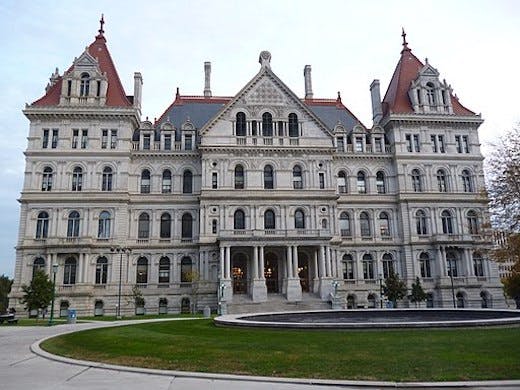Bias Seen as New York Court Throws Out New York District Maps Drawn by Democrats
The state legislature will have until April 11 to redraw the maps. The court also ordered that a “neutral expert” will oversee and prepare the new maps if necessary.

New York Republicans are exuberant following a court ruling that vacates the pro-Democratic redistricting in the state, with their spokesman, John Faso, a former GOP candidate for governor, predicting, in an interview with the Sun, that “our side will be strongly positioned on appeal.”
“The people of New York won and the Albany Democratic politicians lost,” Mr. Faso, a former Republican congressman, told the Sun. “We believe that the language in the constitution is quite clear and the decision is strong and should be upheld on appeal.”
Mr. Faso was addressing the ruling by a judge of the New York State Supreme Court, a trial level tribunal, that determined the congressional district maps enacted by the state legislature, controlled by the Democrats, are unconstitutionally biased. The judge, Patrick McAllister, ordered that new districts be drawn.
The ruling, subject to appeal, calls into question the timing for the state’s election primaries, now scheduled for June 28.
Judge McAllister ruled that Republicans had proved “beyond a reasonable doubt that the map was enacted with political bias.”
The state legislature will have until April 11 to redraw the maps. The court also ordered that a “neutral expert” will oversee and prepare the new maps if necessary. This “expert” would be called upon in the event that the maps the legislature draws do not receive support from both mainstream parties.
“If the maps do not receive bipartisan support or if no revised maps are submitted, then I will retain an expert” at the state’s expense to draw new maps, Judge McAllister wrote. He observed that this process would be “expensive.”
Judge McAllister also warned that “it is possible” New York “would not have a Congressional map in place that meets the Constitutional requirements in time for the primaries even with moving the primary date back to August 23, 2022.” According to the decision, August 23 would be the “last possible date to hold a primary” while still complying with federal election laws.
The battle over redistricting began in February, when state Republicans sued on the same day that Governor Hochul signed off on the new maps. Judge McAllister’s decision cites a 2014 amendment to New York’s constitution designed to prevent partisan gerrymandering, noting, “Districts shall not be drawn to discourage candidates or political parties.”
“The scourge of gerrymandering is not unique in New York,” the decision reads. “In recent years the courts throughout the country have been called on to invalidate gerrymandered districts and to create new fairer districts.”
“Gerrymandering discrimination hurts everone because it tends to silence minority voices,” Judge McAllister wrote. “Then none of us receives the benefit from the input of the silenced.” New York’s Democratic leadership did not immediately respond to a request for comment.
If enacted, the maps could halve New York’s Republican delegation in the United States House. Republicans now hold eight of the state’s 27 seats. The maps under litigation created 20 Democratic-leaning seats in the House, two competitive seats, and four Republican-leaning seats — while one seat was lost to reapportionment after the 2020 Census.
The seats from New York could be of particular importance in the upcoming election cycle. Democrats hold an 11-seat majority in the House, meaning a swing of as few as six seats could put Republicans in control. If Judge McAllister’s ruling is upheld on appeal, it could affect more than the House.
It could affect the race for governor, given that a GOP victory in the litigation would be a black eye for Ms. Hochul, who signed the gerrymander in the first place.

